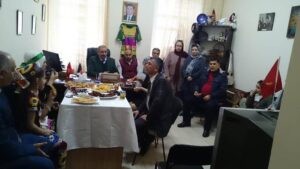A number of women in Ghazni say they have turned to poultry famring to fight against the crippling poverty in the province.
Zohra, a resident of “Gharib Qalandar” village in Ghazni, says she owns over 80 laying hens and earns a good income from selling their eggs each month. She adds, “I sell nearly 60 eggs daily; half of the money goes to buying feed for my chickens, and the rest stays with me. If I had a larger space to keep more chickens, I would expand my poultry farming business.”
Fahima, another resident of Ghazni who recently started poultry farming, says that the income from this work helps meet part of her family’s needs. “I was unemployed and suffering from this situation. A friend of mine was in poultry farming, so I consulted with her and decided to start. It has become a hobby and has somewhat supported my family’s economy.”
These female poultry farmers are calling on the Directorate of Agriculture, Irrigation, and Livestock in Ghazni, as well as humanitarian organizations, to support them and create opportunities for expanding their businesses.
According to statistics provided by the directorate, there are currently 730 poultry farms in the province, a small portion of which are managed by women.
Mohammad Shafiq, the general director of poultry farming at the Directorate of Agriculture, Irrigation, and Livestock, says that they will support female poultry farmers and help them establish poultry farms. “There are farms with between 50 to 100 chickens, where women are working. Our effort is to address the problems of female poultry farmers and provide training programs on poultry management,” he added.
Livestock farming is a major source of income in Afghanistan, with many citizens, especially in remote areas, relying on it to meet both food and non-food needs of their families.
Some economic experts say that addressing the problems of female poultry farmers and supporting them could create opportunities for family economic growth and encourage other women to enter the livestock sector.
Hassan Reza Shayanfar, an economic expert, states, “Establishing small businesses, such as poultry farms, home-based production, carpet weaving, and others, can significantly help solve families’ economic challenges.”
In recent years, many women have turned to small home-based businesses. Previously, the United Nations Food and Agriculture Organization (FAO) in Afghanistan had announced that in 2024, it would support over 18,000 women in the country and distribute laying hens to them.






